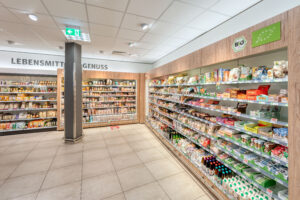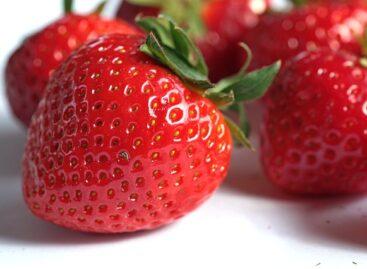Rossmann gives more space to organic food
More shelf space – 15 metres instead of the current average of 9 metres – is planned to be dedicated to organic food in Rossmann stores in Germany.

In an interview with Lebensmittelzeitung, Rossmann’s private label manager Sandra Lorenz said that although the company has already increased the space allocated to organic food by 30% since 2021, demand for these products continues to grow. The expansion of the average 9 metres of shelf space currently dedicated to organic food in 2,300 stores is limited by the space available in each location.
According to Nielsen data, German organic food sales in the drugstore chain grew by 24% in 2024, and the retailer is seeing double-digit growth again this year, above average. The category therefore remains of strategic importance, says Sandra Lorenz.
According to the LZ article, drugstores clearly represent a driving force of the organic food sector in Germany. This is also reflected by the fact that the German Association of Organic Food Manufacturers (BÖLW), which publishes market data annually, previously classified the channel under grocery retailers, but in its 2024 industry report it will now look separately at full-range retailers, discounters and drugstores. According to the report, drugstores have an 11% share in the organic market, accounting for 1.87 billion of the total organic food sales of 16.99 billion. And while full-range retailers grew their sales by 5%, drugstores grew their sales by 19.6%.
The organic business is also important for Rossmann’s top competitor dm: among its own brands, dm Bio food brand is the best performing, says Kerstin Erbe, managing director for product management. At Rossmann, in terms of sales Enerbio comes second to Isana out of 28 own brands.
Food sales seems to be paying off, as the category, as indicated by Sandra Lorenz, “brings frequency” to the stores and has provided Rossmann with a different reach than the classic drugstore assortment, making it easier to manage smaller margins. Organic food fits in with the health focus of drugstores, and the dry goods segment, especially snacks, offers a good opportunity to address customers with innovations.
However, the Enerbio range, which currently comprises 450 items, is not to be significantly expanded – dm offers around 200 SKUs more. But the proportion of certified products could be increased: according to Lorenz, 46 of the private label products are currently Naturland certified and 24 Bioland certified. Including Fair Trade, the share of certified products in the total range is 20%, which the company plans to increase to 30% by 2027.
Related news
Baby Coupon Week is here again at Rossmann – 10% discount on all baby products for Rossmann+ members
Rossmann is committed to supporting families and parents with young…
Read more >German retail sales growth slowed more than expected in May
Retail sales in Germany slowed more than analysts had expected…
Read more >The price of strawberries has doubled in ten years
While in 2015, a kilogram of domestically grown strawberries in…
Read more >Related news
GKI analysis: Why do Hungarian households live more poorly than anyone else in the EU?
Imagine that the residents of every EU country shop in…
Read more >KSH: industrial producer prices decreased by 0.7 percent in May 2025 compared to the previous month, and increased by an average of 6.9 percent compared to a year earlier
In May 2025, industrial producer prices were 6.9 percent higher…
Read more >Consumption drives the economy
According to the latest forecast by the Balance Institute, the…
Read more >






